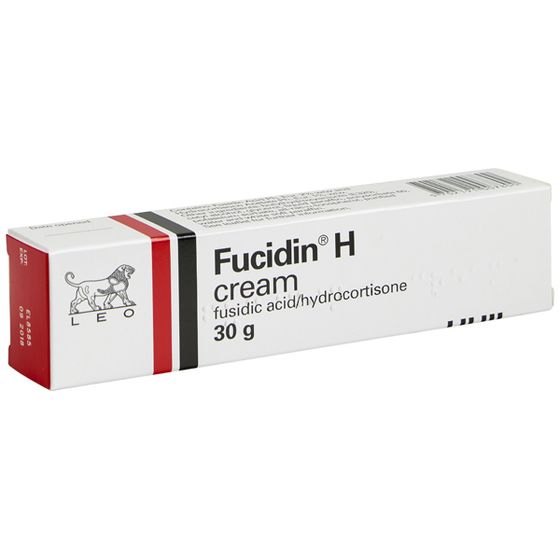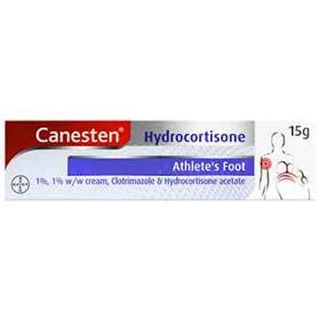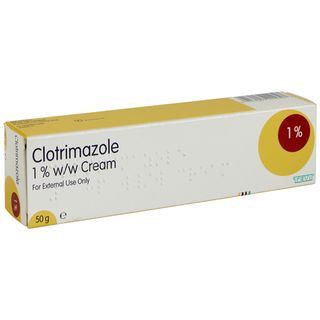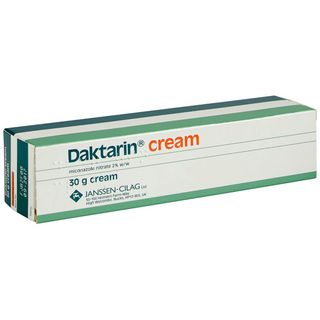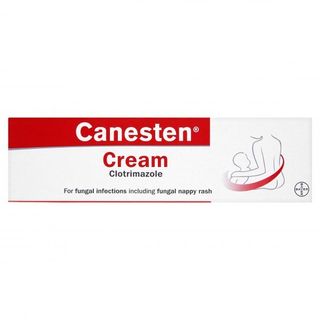
- Fast, discreet delivery
- 100% UK-based pharmacy
- Free advice and support
- We're rated 4.9 out of 5
Based on over 24,000 reviews collected on Google and Reviews.io.
Fucidin H Cream - Available Online
Fucidin H cream is a prescription-only treatment for infectious skin conditions. It combines two active ingredients; fusidic acid, an antibiotic, and hydrocortisone, a mild corticosteroid. These target the bacteria that cause skin infections while also easing inflammation, redness and itching.
You may find Fucidin H effective if you have a skin condition (e.g. eczema or dermatitis) that is worsened by bacteria such as Staphylococcus aureus. By stopping the infection at the source and soothing irritation at the same time, it can speed up your skin's recovery.
Fucidin H is usually applied in a thin layer to affected skin once or twice a day, as directed by our clinical team. It's designed for short-term treatments, and your course will normally last a maximum of two weeks.
If you think this treatment is right for you, our UK-based clinical team will be happy to help. We just need you to fill in a quick, easy and 100% confidential consultation today.
Fucidin H Cream summary
About Fucidin H Cream
What is Fucidin H?
Fucidin H cream is a combination treatment for skin infections, containing fusidic acid and hydrocortisone. It’s designed for the short-term treatment of infected eczema and other inflammatory skin conditions caused by bacteria.
Fusidic acid works to kill the bacteria responsible for infection, while hydrocortisone helps reduce redness, swelling and itching. This dual action alleviates symptoms while helping your skin heal faster.
How Does Fucidin H Work?
Fucidin H has a dual-action formula that works in two ways.
One active ingredient is fusidic acid. This targets the bacteria causing infection, preventing them from forming the proteins that they need to multiply.
Meanwhile, the corticosteroid hydrocortisone reduces inflammation in your skin by suppressing the immune response that triggers redness, itching and swelling.
Together, these ingredients treat both the infection and the symptoms it causes. By addressing these issues together, Fucidin H helps restore your skin more quickly than using either an antibiotic or corticosteroid alone.
How To Use Fucidin H
Always use Fucidin H exactly as directed by our clinical team. Remember to always wash your hands before and after application.
Apply a thin layer and gently rub it into affected skin twice a day, once in the morning and once in the evening.
Avoid covering treated skin with airtight dressings or tight clothing unless advised. Do not use it on large areas of skin or for longer than prescribed.
If your symptoms don’t improve or get worse within seven days, contact a member of our clinical team.
Ingredients
Fucidin H cream contains the active ingredients fusidic acid (20mg) and hydrocortisone acetate (10mg).
Other inactive ingredients include butylhydroxyanisole (E320), cetomacrogol 1000, cetostearyl alcohol, chlorocresol, glycerol, liquid paraffin, potassium sorbate, purified water, sodium dihydrogen phosphate dihydrate, phosphoric acid and white soft paraffin.
Some of these ingredients, such as cetostearyl alcohol or chlorocresol, may cause irritation or allergic reactions in sensitive skin.
Side Effects
Like all medicines, Fucidin H cream can cause side effects. These are usually mild and temporary and not everyone will experience them.
Some people may experience a mild irritation, burning or itching at the application site.
Prolonged use, especially under tight dressings, may thin your skin or cause stretch marks, redness or changes in skin colour.
Rarely, allergic reactions such as rash or swelling may occur. If you notice signs of an allergic reaction, stop using the cream and seek advice from our clinical team.
If you experience extreme allergic reactions, including difficulty breathing or swallowing or swelling of the mouth, face or throat, seek emergency medical attention.
Warnings
Fucidin H is for external use only. While Fucidin H cream can be used on your face, avoid using it for long periods of time and keep it away from your eyes, mouth and mucous membranes.
Do not use the cream on open wounds, broken skin or large areas for extended periods. Long-term use may increase the risk of skin thinning, adrenal suppression or antibiotic resistance.
Ask our clinical team for advice if you are pregnant, breastfeeding or have other skin conditions. Keep out of the sight and reach of children. As its formulation contains paraffin, clothing that has been in contact with Fucidin H burns more easily and should be considered a serious fire hazard.
Fucidin H Cream reviews
Fucidin H FAQs
What Is Fucidin H Used For?
Fucidin H cream is used to treat eczema, dermatitis and other skin conditions that are affected by bacterial infections like Staphylococcus aureus. It contains fusidic acid, an antibiotic that stops bacteria from growing, and hydrocortisone, a mild corticosteroid that reduces inflammation, redness and itching.
This dual action makes it an effective treatment for short-term use when your skin condition needs both antibacterial treatment and symptom relief.
Fucidin H may be prescribed if skin affected by a condition like eczema or dermatitis becomes infected. This usually happens when scratching damages your skin barrier and allows the bacteria that are living harmlessly on the surface into your skin.
It’s important to complete your prescribed course, even if your symptoms improve quickly, to ensure the infection is fully treated and reduce the risk of antibiotic resistance.
How Should Fucidin H Cream Be Applied?
Apply a thin layer to your affected skin and rub it in gently. Repeat this twice a day, once in the morning and once in the evening, or as directed by our clinical team. Avoid covering treated skin with airtight dressings or tight clothing.
If you miss an application, apply it as soon as you remember to, unless it’s nearly time for your next one.
Always wash your hands before and after applying.
Can Fucidin H Cream Be Used On All Skin Types?
While Fucidin H can be used on dry or oily skin, it's not suitable for everyone. If you have very sensitive skin or are allergic to any of the ingredients in the cream, it can cause irritation or worsen symptoms of eczema or dermatitis.
A member of our clinical team can help you determine whether Fucidin H cream is the best option for you based on your skin type.
Can Fucidin H Be Used On Children?
While Fucidin H can be safe for children to use, you should only do so as directed by our clinical team. Children's skin is thinner, making it more vulnerable to side effects.
Dosages will be lower for children than for adults.
Can I Use Fucidin H Cream If I’m Pregnant Or Breastfeeding?
Fucidin H cream is generally safe to use if you are pregnant. Very little of it is absorbed into your system, so the chances of it affecting your baby are extremely low. Nonetheless, you should check with a member of our clinical team before using Fucidin if you are pregnant or are trying to get pregnant.
Avoid applying Fucidin to the skin of your breasts before breastfeeding, as this can result in accidental ingestion by your baby.
Can Fucidin H Cream Treat Fungal Infections?
No. Fucidin H cream should be used for bacterial infections only. It should not be used on fungal infections as it will not target the cause of the infection. Because it works by suppressing the skin's immune response, it can actually make fungal infections worse.
If you're unsure whether your skin infection is bacterial or fungal in nature, a member of our clinical team will be more than happy to advise you.
How Quickly Does Fucidin H Work?
People who use Fucidin H for bacterial skin infections typically see a reduction in redness, swelling and itching within a few days. However, it’s important to complete the full prescribed course, even if your symptoms improve. This will make sure the infection has been fully treated and prevent bacteria from becoming resistant to the treatment.
If your symptoms have not improved after 14 days, or if they get worse, contact our clinical team. They will be able to advise you on further treatment.
How Long Can I Use Fucidin H?
Fucidin H cream is intended for short-term use only and should be used once or twice a day as directed by our clinical team for no more than 14 days. If your skin does not show signs of improvement within seven days, contact our clinical team. They will be able to recommend a more effective treatment.
Can I Use Other Skincare Products At The Same Time?
It depends. You should check with our clinical team before using other skincare products alongside Fucidin H, as the combination may cause irritation to your skin.
It is usually safe to use emollients or moisturisers with Fucidin H. However, you should apply them at different times to avoid reducing its effectiveness. You should wait at least 30 minutes after applying Fucidin H before using other skincare products on the same area.
Avoid applying other medicated creams to treated skin unless instructed to do so by our clinical team.
How Can I Buy Fucidin H Cream Online?
Fucidin H cream is a prescription-only medication. If you'd like to order this treatment from The Independent Pharmacy, we just need you to complete a quick, easy, secure and 100% confidential consultation with our UK‑based team.
This helps us confirm that this is a safe and suitable treatment for you.
Your medicine will be delivered in discreet packaging to your door. Our clinical team is always available to support you in every stage of your skincare treatment. Let us know if you have any questions about Fucidin or any of our other treatments.
Whats the Difference Between Fucidin H and Fucidin?
Fucidin H is a version of Fucidin Cream with the addition of a mild steroid called hydrocortisone, making it stronger with a more potent anti-inflammatory effect.
Regular Fucidin is more suitable for use on skin that is severely cracked or broken, or that simply isn’t particularly inflamed.
How Does This Compare to Treatments like Fucibet or Betnovate?
Fucibet is stronger than Fucidin H, containing the same fusidic acid but alongside betamethasone, a more powerful steroid. Betnovate, meanwhile, contains betamethasone, but without the fusidic acid.
Fucibet should be used where there is an infection present but also significant inflammation or redness. Betnovate is more suitable when there is significant irritation, redness, or inflammation but no infection.
Can I Use Other Eczema Treatments with This Cream?
As long as they don’t contain steroids or antibiotics, yes. Standard emollients will help keep your skin hydrated and prevent further irritation from drying and cracking.
Why Can I Only Order Two Tubes at a Time?
Because this is a prescription-strength treatment, we must limit our supply to meet national guidelines and protect the safety of our patients. Since this cream is not typically used for more than 7-10 days, two tubes are more than enough to completely treat a large area.
Can I Use this Treatment While Pregnant or Breastfeeding?
It isn’t advisable while pregnant, because animal studies have shown that the active corticosteroid (hydrocortisone) can cause harm to unborn babies, but it is safe enough to use while breastfeeding as long as it isn’t applied to the breast.
Either way, discuss the matter with your doctor first, because every case is different.
How Do I Stop my Eczema from Recurring After Treatment?
Once you’ve finished your round of treatment, the infection should have cleared, and the skin should be getting better. To avoid the issue returning, you should take care to moisturise the skin regularly — but be careful to only use moisturisers that don’t cause irritation.
Look out for medical moisturisers (emollients) such as Dermol or Doublebase, because they’re perfectly safe to use on damaged skin. They tend to be colourless and scent-free, and they’re available as ointments, creams, lotions, and bath additives.
For further information on the types of emollients available, how they differ, and when it’s best to use them, visit our dedicated section on eczema treatments.
What Will Happen if I Don't Treat my Eczema?
If you leave your eczema untreated, you can suffer complications such as neurodermatitis, eye problems, or further skin infections. As such, it isn’t advisable to just leave eczema alone if it isn’t getting better without treatment.
Related Treatments
Visit our Skin Infections page for treatments, advice and FAQs.
Ordering as easy as 1, 2, 3
1. Find the ideal treatment
2. Get a free consultation
3. Enjoy speedy delivery
